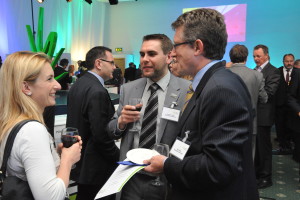Professional Networking Etiquette
Posted: February 9, 2015, 7:20 p.m.
by Kaitlin Goins.
If you haven’t been there before, you’ll likely be there soon: walking into a professional event full of people you don’t know with jobs that you dream of having. How do you get their business card? How do you start the conversation? How do you talk about yourself enough that they are impressed without sounding arrogant? How do you carefully walk that line between professional, business and conversational? How do you network?
Before the event
Above all else, be prepared. Professional events already come with anxiety. In order to alleviate some of those nerves, take a few steps beforehand to ensure you will be at your prime when you walk in the door.

Have up-to-date business cards ready, and have them in a convenient pocket. When your business cards are in the bottom of your purse or in your wallet, they are not readily at-hand, and they are susceptible to getting bent or smudged. If they are in your coat pocket, they will be ready when you make that contact.
Dress professionally. Depending on the event, the dress code will probably be either business casual or business professional. Women’s dresses should hit the knee or just above. Remember that when you sit down, the hemline will rise, and you do not want your hemline to distract from your professional experience. Men should wear a button-down shirt, tie and jacket. Be sure they are tailored to fit correctly.
Shoes should be professional as well. If you wear heels, be sure they are comfortable and not too high. Men’s shoes should be polished and unscuffed. However, Pamela Eyring, president of The Protocol School of Washington, said the difference between looking professional and amateur is all in the hair.

“The hair gives away immaturity,” Eyring said. “Long hair that gets in your eyes or covers your name tag — pull it up. Guys should be well-shaved and groomed. Hair is their issue. Trim it; shave around the beard area. If you have longer hair, be sure your neck is shaved, even the back of your neck. Two eyebrows are better than one.”
Finally, do your research. Who is going to be there? Do you already know some of them? Research the people who will be attending. Anita Hamlett, director of academic and professional advancement for the University of Alabama’s department of advertising and public relations, suggested that you should learn key information about the people scheduled to attend.
“You may decide to strategically try to meet those people during the evening,” Hamlett said. “In doing this, you have shown the potential employer that you recognized her and sought her out in the crowd.”
At the event
Eyring said one of the largest holdbacks at a professional event is a cellphone.
“Put your technology device away; step away from it,” Eyring said. “If they see you with nose in your phone, they won’t be impressed or they may walk away.”
When you first walk into the building, do some situational awareness. Find out where the bar is and where the restrooms are. Get your bearings before you dive in headfirst.

Then get a drink.
“Wine says you’re sophisticated,” Eyring said. “When you’re drinking cocktails — you’re a little more mature. If you want a beer, get a beer in a glass and not a beer bottle. This isn’t a frat party. This is a networking situation.”
Eyring suggested you limit your drinks to two and hold your drink in your left hand so your right hand is available for a handshake.
When you walk up to a group of people, you want to introduce yourself. If they are already talking, get in their line of sight. When someone gives you eye contact, give a slight smile, then ask permission to join the conversation.
“The handshake is still important,” Eyring said. “It’s not gender-related any longer. You still want to have a firm handshake and maintain eye contact 40-50 percent of the time. Offer your hand, and introduce yourself with your first and last name.”
Repeating each person’s name to yourself will help you remember it later, Eyring said.
Once you get past the introduction, proactive listening skills are the key to looking poised and confident, according to Hamlett.
“Practice active listening skills — eye contact, head nods, leaning in when appropriate — all skills you can sharpen by using them at a party with your friends or at dinner with your grandmother,” Hamlett said. “Developing the ability to listen and pick up valuable information to import back into a conversation will help you in many facets of your career search and beyond.”
Once you introduce yourself and start a conversation, you want to network and get that contact.
“You are a student, not a used car salesperson, so your goal is not to make a quick sale, right?” Hamlett said. “Your goal is to make a great first impression. A laundry list of accomplishments is not memorable.”
Having a few key nuggets of information about yourself to insert into the conversation casually will give others the information you want them to know, without actually pulling out the résumé. Be sure to tailor this information to the person to whom you are speaking. It all goes back to research.
As the conversation is dying down, it is time to get the business card. Eyring said the best way to end the conversation is to compliment the person.
“As the conversation dies down,” Eyring said, “share that they inspired you and that you might apply to their company; see if you can get your foot in the door. Say ‘This just validated my decision to apply to your company. I’d really like to learn more about your career field — would it be possible for me to give you a call sometime to talk?’ If they say yes, ask how you can reach them.”
Be appreciative of their time and thank them.
After the event
Don’t be too quick to follow up, but don’t wait too long. Two to three days is enough. Eyring said not to follow up on a Monday because everyone is catching up from the weekend. If the person does not get back to you within a week, follow up again through a different medium. Email first, then phone call, or vice versa.
Networking events are stressful, but can lead to some great contacts, mentors and maybe even jobs or internships. Take the time beforehand to prepare for the event so you are poised, confident and professional. First impressions count, so make yours memorable.
Opinions
Comments are closed.





Post comment
This is a great resource for students! I love it.
Permalink